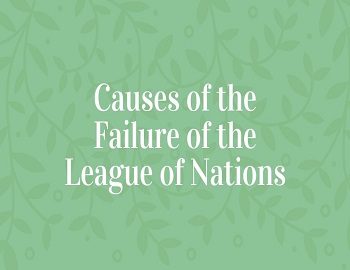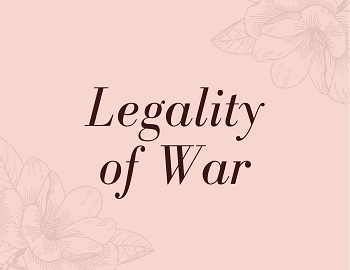Causes of the Failure of the League of Nations:
We have seen that the League failed in its primary objects of preserving world peace. Now the question arises as to what are the chief causes of its failure.
According to Anthony Eden, the failure of the league was due to two causes. The idea of one nation, one vote, led to Liberia being as important as the Soviet Union or Costa Rica as important as the United Kingdom. That was not a sound basis on which to found an international organization because it was not a basis of truth. The League, though conceived as universal, was in fact never universal. According to Potter, “The League of Nations failed in so far as it failed- because the peoples of Germany, Japan and Italy preferred to support their governments in careers of imperialistic conquest, and because the peoples of England, France and the United States discouraged their governments from taking effective action early enough to stem the tide of Axis aggression. The peoples and governments of totalitarian states were more responsible for the destruction of international collaboration under league auspices than those of the liberal states, but the latter must bear a large share of negative blame”. Again, “It was not the League of Nations but the Nations of the League which failed, in so far as there was a failure. The legal theory of organization was defective on this side, perhaps but this did not preclude action by the Members for effective promotion of security and welfare beyond what was required of them; it is probably true that they lived up to their obligations in the main but they certainly failed to live up to the ideals or the principles or the clear implications of the Covenant. The techniques of the Council and numerous conferences and even of the Secretariat were too ‘diplomatic’ but this was mainly because of the attitude taken by the government of the Member States. Certainly, the League did not fail because of any major defect in its general structure and even defects of individual organs. For what it is worth the conclusion can be adopted almost without qualification that the League failed especially in the maintenance of peace and security because its leading members, France and Great Britain, failed to support it with sufficient vigour in the Manchurian and the Ethiopian cases”.
Prof. Hans Morgenthau finds three weaknesses in the League- constitutional weakness, structural weakness and political weakness. However, the main causes of its failure can be stated as under-
- Ineffective Machinery- The League of Nations did not have any effective machinery at its command for dealing with aggressive acts. It had no force for compelling agreements. It could only make recommendations to its member’s states for an economic boycott or economic sanctions against the aggressor. The rule of unanimity made the working of the League impossible because it was always difficult to reach it in the face of conflicting interests being present in the League.
- Unwillingness of the Big Powers to Cooperate- Another cause of the failure of the League was that the big powers were unwilling to cooperate under the League Covenant. While Great Britain and France joined the League, they did not change their behaviour. Great Britain looked upon the League as a means to perpetuate the balance of power. France looked upon the League as a means to encircle Germany. The United States was not a member of the League and acted in its own interest.
- Bad Foundation- The League failed because it had a bad foundation. In fact, it was a mistake to make the League Covenant a part of the Treaty of Versailles. From its very beginning, it was regarded as an association of victor nations, built up to execute the terms of the Treaty of Versailles.
- Narrow Nationalism- The undesirable aspect of nationalism ‘as every country tried to save itself at the expense of the rest of the world’ was also a serious handicap in the successful working of the League. France was mostly interested in her national security, while Great Britain considered that problem less important than promoting British Commerce, Japan wanted to consolidate her position in the world scene at the expense of others. As a matter of fact, nationalism in its narrow sense had been the accepted policy of every state. So, this also proved to be a great handicap.
- Economic Nationalism- Lastly, economic nationalism was also the main reason for the League’s failure. The desire for more and more territories and the craze for new markets became a mania with every state. So, this made the League’s work impossible and as such contributed to the League’s failure in achieving its primary object- the maintenance of peace and order in the world.









Comments (No)